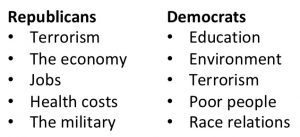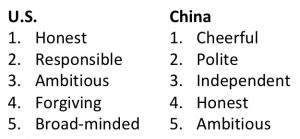Even If We Don’t Share The Same Values, We Can Still Get Along
Why does it surprise people that others don’t share their values?
In a Washington Post article, Eugene Scott makes a political observation:
“While Americans have always known they don’t all share the same politics, more of them are now questioning whether their political opponents even share their same values.”
Scott then highlights the differences in the top 5 policy priorities of Republicans vs. Democrats, as reported in a January 2017 survey:

We shouldn’t be surprised at this. If we compare a list of priorities between any two groups – or even 2 individuals – we will rarely find the same list, if ever. As you go down the list, at some point the items on each list will differ.
Rokeach Value Survey
Someone who really understood this issue was Milton Rokeach, a social psychologist and values theorist. Rokeach is well known for creating the Rokeach Value Survey (RVS), which he outlined in his 1973 book The Nature of Human Values. The RVS consists of 18 terminal values (desirable end-states of existence) and 18 instrumental values (desirable modes of behavior to reach those end-states of existence), that has been used by researchers for over 40 years.
A key benefit of the RVS is the ability to quickly assess the difference in values across different groups of people (i.e. countries). For example, from Rokeach’s research, we can compare the top 5 Instrumental Values of the U.S. vs. China in 1971:

Not surprisingly, the top values in each country have changed over time. But what has not changed is the fact that each country’s list is different from the other.
I posit that every country, state, city, agency, business, organization, church, non-profit, family, and individual has a unique set of values, regardless if they know it or even acknowledge it.
But if we all have unique values, how do we manage to get along?
Linking Personal Values to Organizational Values
When I facilitate a group exercise to identify personal values, where individuals select their top 3 personal values, I’m often asked this question:
“How do we link our personal values to our organization’s values?”
Here’s the short answer: Leadership.
If leaders can succinctly identify and define the top few values for their organization (ideally just 3), it’s then easy for individuals to link their personal values.
Here’s how: it’s a matter of choice.
If individuals know what’s expected and/or what matters most, they can either: a) adapt and support it; or b) reject it and leave. Experience has shown most adapt. And for those who reject the values but don’t leave, they tend to expose themselves rather quickly, which ultimately ends in their departure.
Consider the following examples:
- A company articulates 3 values: Teamwork, Persistence, and Accountability. Employees then know to adhere to these values, even if these are not at the top of their personal list of values.
- A church articulates 3 values: Compassion, Generosity, and Unity. Members, staff, and volunteers then know to live these values, even if these are not at the top of their personal list of values.
- A community (i.e. city or state government) promotes 3 values: Transparency, Diversity, and Service. It’s citizens then know to abide by (and promote) these values, even if these are not at the top of their personal list of values.
In all cases, the successful linking of personal values with an organization’s values is determined by the leaders. This is also true for families and even countries.
Of course while everyone can choose to adapt, there are some that don’t want to adapt, or find it hard to adapt. In such cases they may choose to go someplace else.
NOTE: just because people adapt to fulfill the stated values of an organization or community doesn’t mean they have altered their personal values.
Bottom line: it’s the leaders job to identify and clearly articulate the few values of an organization or community. It’s also the leaders’ job to help individuals align personal values to the organization’s values so as to eliminate any values conflict, and ultimately help everyone get along.









